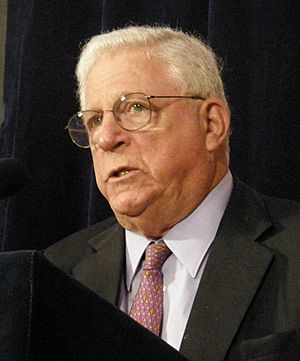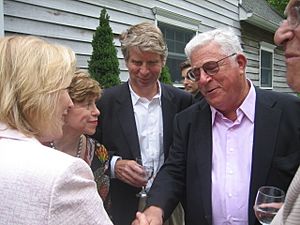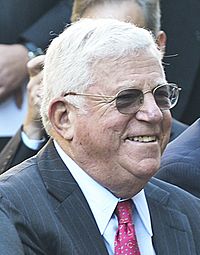Richard Ravitch facts for kids
Quick facts for kids
Richard Ravitch
|
|
|---|---|
 |
|
| Lieutenant Governor of New York | |
| In office July 8, 2009 – December 31, 2010 |
|
| Governor | David Paterson |
| Preceded by | Pedro Espada (acting) |
| Succeeded by | Robert Duffy |
| 4th Chairman of the Metropolitan Transportation Authority |
|
| In office November 16, 1979 – October 31, 1983 |
|
| Governor | Hugh Carey Mario Cuomo |
| Preceded by | Harold Fisher |
| Succeeded by | Bob Kiley |
| Chairman of Empire State Development Corporation | |
| In office April 30, 1975 – March 23, 1977 |
|
| Governor | Hugh Carey |
| Preceded by | Alton Marshall |
| Succeeded by | William Hassett |
| Personal details | |
| Born | July 7, 1933 Brooklyn, New York, U.S. |
| Died | June 25, 2023 (aged 89) Manhattan, New York, U.S. |
| Political party | Democratic |
| Spouses |
Diane Silvers
(m. 1960; div. 1986)Betsy Perry (divorced) Kathleen Doyle
(m. 2005) |
| Children | 2 (with Silvers) |
| Education | Columbia University (BA) Yale University (JD) |
Richard Ravitch (July 7, 1933 – June 25, 2023) was an American politician and businessman. He served as Lieutenant Governor of New York from 2009 to 2010. New York Governor David Paterson appointed him to this role in July 2009.
Ravitch was born in New York City. He studied at Yale Law School. He worked in his family's real estate business. He also held many government jobs. These included roles with the New York State Urban Development Corporation and the Metropolitan Transportation Authority. He also worked in private companies.
Contents
Early Life and Education
Richard Ravitch was born on July 7, 1933, in Brooklyn, New York City. His family was Jewish. His father, Saul Ravitch, helped start HRH Construction Corporation. This company built many projects, including parts of Columbia University Law School and New York University Hospital. Richard was the third generation of his family to work in the company.
He went to Columbia College. He earned a degree in American History in 1955. He then went to Yale Law School and got his law degree in 1958. After law school, he served a short time in the U.S. Army.
A Career in Public Service
After law school, Ravitch worked for government committees in Washington, D.C., and New York City. In 1960, he joined his family's construction business. He focused on building affordable housing projects. Some of his notable projects were Waterside Plaza, Riverbend, and Manhattan Plaza in Manhattan. He also built the first integrated housing projects in Washington, D.C.
Helping New York's Development
In 1975, New York State Governor Hugh Carey chose Ravitch to lead the New York State Urban Development Corporation. This organization was facing financial trouble. Ravitch successfully helped fix its money problems. He then brought in a new president but stayed on as an unpaid chairman. In 1977, he sold his family's construction business.
Leading the MTA
Governor Carey again appointed Ravitch in 1979. This time, he became the head of the Metropolitan Transportation Authority (MTA). The MTA runs New York City's subways and buses. Ravitch did not take a salary for this important job. He worked hard to improve the system. He helped get more money for the MTA and built the Metro-North Railroad. He also worked to improve relationships with transit workers.
During his time at the MTA, there was a major transit strike in 1980. He faced many challenges during this period. He led the MTA until 1983.
Other Important Roles
In 1985, Ravitch became the chairman of the Bowery Savings Bank in New York. The bank had been losing money. Ravitch put together a group of investors to take over the bank. He helped the bank become profitable again.
He also briefly considered running for mayor of New York City in 1977. He later ran for the Democratic nomination for mayor in 1989. He placed third in that election.
In 1991, Major League Baseball owners hired Ravitch. He became their chief negotiator for player contracts. He worked to find agreements between the owners and players. However, negotiations in 1994 did not stop a major strike. This strike ended the 1994 baseball season. Ravitch resigned from this role in December 1994.
In 1995, New York Mayor Rudolph Giuliani considered Ravitch to lead the city's school system. Ravitch decided not to take the job. He believed the school system needed big changes to its structure.
Ravitch continued to work on important issues. In 2000, he was chosen to co-chair the Millennial Housing Commission. This group advised the United States Congress on how to increase affordable housing. In 2003, he received an award for his work in housing.
In 2008, Governor David Paterson asked Ravitch to help fix the MTA's finances again.
Lieutenant Governor of New York
In 2008, New York's Lieutenant Governor, David Paterson, became governor. This left the Lieutenant Governor position empty. In 2009, Governor Paterson appointed Ravitch to fill this role. Ravitch was sworn in on July 8, 2009.
His appointment led to some legal discussions. The New York Attorney General questioned if the governor could appoint a lieutenant governor. After several court rulings, the highest court in New York, the New York Court of Appeals, decided that the governor did have the power to appoint someone.
As Lieutenant Governor, Ravitch chose not to receive a salary. His main goal was to improve how New York State managed its budget. He worked on recommendations to fix the state's financial problems. While his plans were not fully accepted, he helped people understand the serious budget issues facing New York.
Later Career and Legacy
In 2012, Ravitch co-chaired the State Budget Crisis Task Force. This group looked at the financial health of several U.S. states. Their report warned that states needed clearer accounting of their debts. It also said that rising healthcare and retirement costs could make it harder for states to fund other important services.
Ravitch wrote an autobiography called So Much to Do: A Full Life of Business, Politics, and Confronting Fiscal Crises. It was published in 2014. The book talks about how unclear budgeting can hurt states. It also highlights the importance of the political process.
Personal Life
Richard Ravitch married Diane Ravitch in 1960. They had two sons, Joseph and Michael. They divorced in 1986. He later married Betsy F. Perry, but they also divorced. In 2005, he married Kathleen M. Doyle.
Richard Ravitch passed away on June 25, 2023, in Manhattan. He was 89 years old.
Works
- Ravitch, Richard, "So Much to Do: A Full Life of Business, Politics, and Confronting Fiscal Crises" New York, New York, 2014
 | Georgia Louise Harris Brown |
 | Julian Abele |
 | Norma Merrick Sklarek |
 | William Sidney Pittman |



